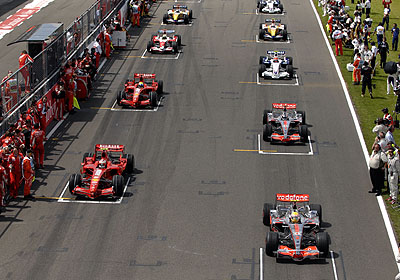


24/09/2007
NEWS STORY
 |
For almost two years pundits have speculated about what the future will hold for F1 under its new owners CVC. With the 'Hamilton-effect' and spying scandals increasing the sport's profile this year it might be natural to assume that all was well financially too but the latest business results show that where profits are concerned, the brakes are on.
An article in the Sunday Telegraph by regular Pitpass contributors, Christian Sylt and Caroline Reid, reveals that profits for the group which runs F1 have crashed from $312.7m down to just $6m since the sport was acquired by CVC at the end of 2005. The fall has been driven by interest and repayments totalling $220m made by the group on the $2.5bn loan taken out in order to finance CVC's purchase of F1.
The figures are revealed in the latest accounts for UK company Alpha D2. This was lent the lion's share of the loan used by a company it owns called Alpha Prema to acquire F1.
Alpha D2's accounts only cover a nine-month period from the end of March until the end of 2006 and this includes 16 of the 18 races held last year. The reason that Alpha D2 only began recording results for the F1 Group at the end of March 2006 is that this was when the European Commission had cleared CVC's deal.
The bulk of Alpha D2's revenues come from the commercial rights to F1. The rights are directly held by Formula One Administration (FOA) which is one of Alpha D2's subsidiaries. The rights generate revenue from media companies and circuits paying to host F1 events and they fuelled Alpha D2's $725.2m turnover.
Alpha D2's accounts state that for the full-year 2006, FOA's turnover increased 6% but this still lags behind recent years which have seen the company's growth rise over 10% year-on-year. This kind of growth would be expected since FOA's key contracts, such as those for hosting races, are believed to rise by 10% annually.
Despite its high turnover, Alpha D2's profit margins are squeezed by having huge overheads which total $484.6m. A payment to the F1 teams makes up one of the biggest chunks of this. The teams receive as annual prize money a total of 47% of the revenue from F1 television rights deals which is believed to be around $380m. This gives Alpha D2 an operating profit of $240.4m but debt repayments of $220m put a huge dent in it leaving a retained profit of just $6m.
Before CVC bought F1, the sport's main debt was a $1.4bn loan taken out in 1999 and secured on future revenues. At the end of 2005 FOA had just $144.7m of this to repay and its retained profit was a healthy $312.7m. In contrast, Alpha D2's net debt stands at $2.3bn.
The huge debt burden on F1's balance sheet has a real impact for the man on the street. To make its whopping annual debt repayments, F1 really does have to maximise its revenues. F1 now holds fewer races in Europe and more than ever before in Asia where governments are prepared to fund the sky-high race hosting fees. Formula Money (www.formulamoney.com), which analyses F1's financial health, estimates that countries such as China and Bahrain are paying over $25m annually for their races and this trend is set to continue.
Over the next four years new F1 races are scheduled to take place in South Korea, India, Abu Dhabi and Singapore. These will bring in a total of around $140m to FOA annually and are likely to further reduce the number of races in Europe, which have already reduced from 12 ten years ago to 8 this year. This has a knock-on effect on teams since the majority of their revenues come from sponsorship and presence in key countries is crucial to keep this up.
The first big casualty of F1's new drive eastwards has been the US Grand Prix which was scrapped earlier this year. Despite please from F1 teams, the race hit the buffers because the Indianapolis Motor Speedway refused to pay the fees FOA demanded. The question on seasoned observers' lips now is which race could crash off the calendar next to make way for a big bucks signing.